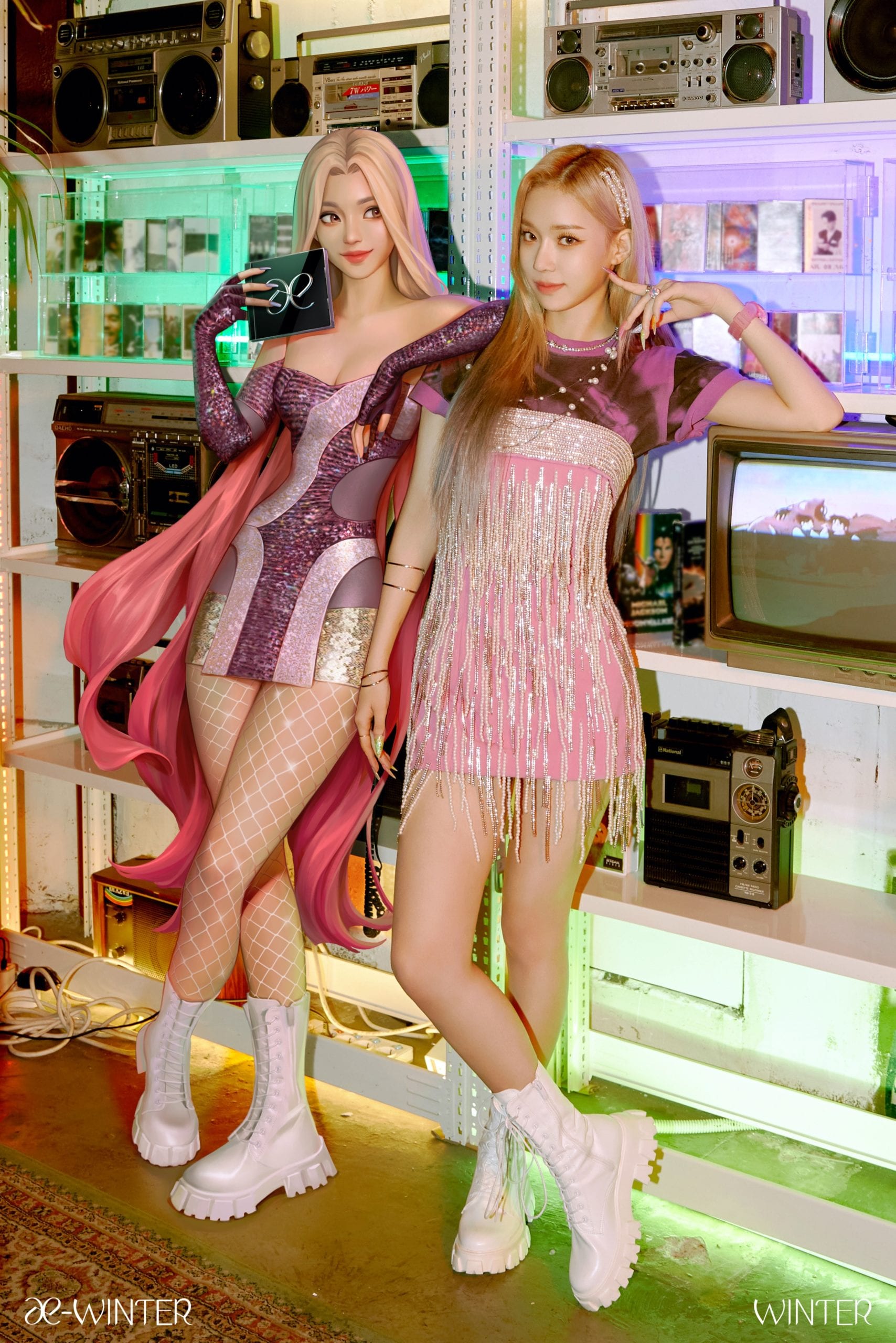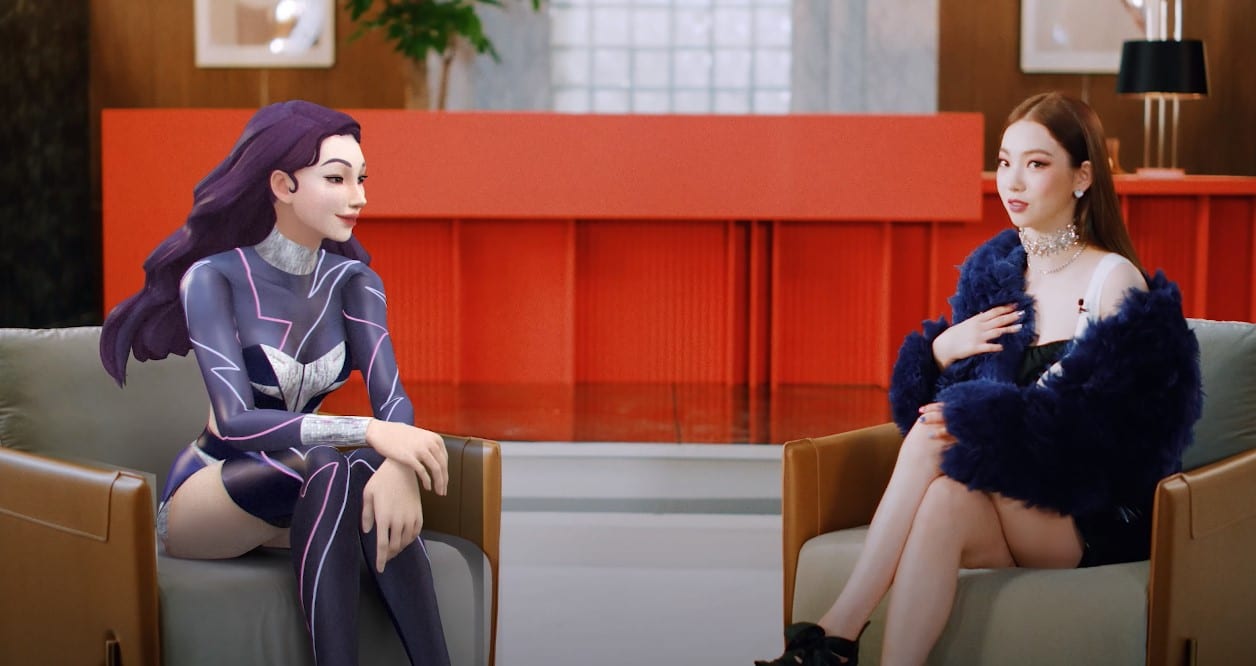The attention of both music fans and the law industry have turned towards the virtual members of SM EntertainmentŌĆÖs new group aespa. More specifically, those in the law field are wondering to what extent the real-life membersŌĆÖ rights will be protected if they promote alongside their virtual counterparts. In addition, fans have particularly focused on if the members will receive protection from ŌĆ£Digital Sexual Crimes,ŌĆØ which have been an issue recently. On October 28th SM Entertainment introduced their new girl group aespa, which consists of Korean members Winter and Karina, Chinese member NingNing, and Japanese member Giselle. The groupŌĆÖs primary concept revolves around a ŌĆ£collaborationŌĆØ between the real world and the virtual world. aespa is a name that combines ŌĆ£├”,ŌĆØ which expresses ŌĆ£Avatar X Experience,ŌĆØ and the English word ŌĆ£aspect,ŌĆØ which means double-sided. The basis of aespaŌĆÖs universe is that each real-life member will get to explore a new world after meeting their other self, an Avatar. According to Lee Soo Man at the first World Culture and Industry Forum (WCIF), ŌĆ£aespa has artist members who exist in the real world and there are avatar members who exist in the virtual world. This universe shows how they interact and communicate through the digital world, which is a space between reality and ŌĆśvirtuality.ŌĆÖ aespa will be a new and innovative group that projects a future world centered on celebrities and avatars and transcends boundaries between the real and virtual worlds.ŌĆØ It is important to note that these Avatars are not stand-alone characters, but rather models of real people. This is different from the game character idol group ŌĆ£K/DA,ŌĆØ which consists of characters that only exist in a video game. SM Entertainment is the first major label to debut a group with real members and virtual characters based on them. So to what extent will the law protect these idols, who will be actively promoting alongside their Avatars? The conversation revolves around questions on how far these laws will protect both the real and virtual members. In the case that virtual members are solely characters that were created, then they would only be protected by copyright laws. However, since these avatars are based on real humans, legal issues can become more complicated, as copyright laws, portrait rights, and right of publicity are involved. Kwon Dan, the representative attorney at DKL Partners law firm, explained, ŌĆ£If the avatar is purely a character created by a company from scratch, then it is protected by copyright. In addition, the AI program that was used to create these Avatars is also protected by copyright as it is something created by the company.ŌĆØ Kang Jin Seok, the representative attorney for the law firm that works with the Korea Entertainment Management Association, said, ŌĆ£Normally, it is the law for the rights of individuals to be protected. However, the rights of ŌĆśae-KarinaŌĆÖ can change depending on KarinaŌĆÖs contract with SM Entertainment. These ŌĆśrightsŌĆÖ will most likely be set by an exclusive contract or a related legal annex.ŌĆØ In other words, while Karina may be able to negotiate the distribution of profits regarding the Avatar or AI with her company, she will not be able to claim the ownership or copyright of the Avatar even if her likeness was used since it was created by the company. However, legal experts contend that, because these Avatars are created based on KarinaŌĆÖs appearance and personality and are being commercially used, Karina should be entitled to use anything based on her likeness on the premise of it being a personal right, according to legal precedent. What will happen when the artistsŌĆÖ contracts end? If a member leaves the group or the group disbanded, then their rights to use their own likeness or even their name will be immediately considered null and void. However, in the case that Avatars are only protected by copyright and not portrait rights or rights of publicity, then they will be able to use these Avatar characters even when the contracts are terminated. But the copyrights on these characters and the AI program will still belong to the company. In addition, there are issues with these Avatars being exposed to other forms of Digital Sexual Crimes, like explicit ŌĆ£Deep FakeŌĆØ content. ŌĆ£Deep FakeŌĆØ refers to the use of various AI technology to manipulate and synthesize the faces of different characters into different videos, such as obscene materials. Female idols have recently become victims of this crime. Further, as these characters are based on humans, the possibility of Avatars becoming targets of ŌĆ£Deep fakeŌĆØ crimes. The problem with this is that it is difficult to hand out concrete punishment if these Avatar characters, which are the counterparts of the real-life members, become victims of these Digital Sexual Crimes. According to paragraph 1 of article 14-2 of the ŌĆśAct On Special Cases Concerning The Punishment, Etc. Of Sexual Crimes,ŌĆÖ which was amended specifically because of deep fake crimes, people who use a personŌĆÖs face, body, or audio recordings to create deep fake materials are subject to punishments. However, as Avatars are not considered as ŌĆ£people,ŌĆØ they will most likely not be considered victims of this crime. Attorney Kwon Dan added, ŌĆ£Since Avatars like ŌĆśae-KarinaŌĆÖ and ŌĆśae-WinterŌĆÖ are technically not considered ŌĆśhuman,ŌĆÖ it will be difficult to punish perpetrators of crimes involving these characters as they do not meet the prerequisites of the revised law on deep fake crimes.ŌĆØ However, it is possible to protect the rights of the real members through less intense legal action. According to attorney Kwon Dan, ŌĆ£while using a real memberŌĆÖs likeness in deep fake materials is considered a crime, it will be difficult to file a lawsuit if the said material does not involve the real-life member. However, it is still possible to file civil lawsuits or alimonies on the basis of emotional distress and damage.ŌĆØ Attorney Kang Jin Seok said, ŌĆ£Though it appears that the Avatar members will not be considered victims of such laws, it is still considered a crime if the real-life members are the victims. The court can judge if a Digital Sexual Crime was violated based on these situations. Additionally, the members can sue the perpetrators as they are victims of such crimes.ŌĆØ As AI and technology involving Avatars become more widespread in popular culture, discussions about changes in different laws have slowly begun. An attorney who specializes in intellectual property (IP) rights said, ŌĆ£As different contents that revolve around virtual worlds, such as ŌĆśVirtual YouTubers,ŌĆÖ have taken Japan by storm, conversations about the social and legal implications have already begun. But in Korea, these contents have just started to be produced. It is imperative to discuss amendments to laws involving the rights of an AI character and the rights that artists have after contract termination. A representative from SM Entertainment revealed, ŌĆ£As we are debuting a group that is created through completely new concepts, we are not able to discuss the specific details of the subject at hand. However, we vow to take legal action against those who damage the honor and rights of our artists and utilize our contents in an unauthorized and inappropriate manner.ŌĆØ Source (1)



